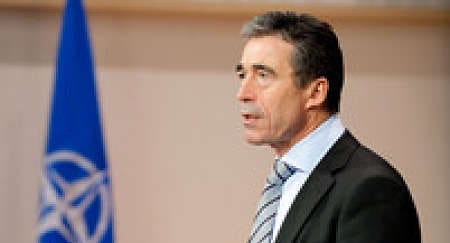There has been little economic good news of late. Budgetary pressures are growing across NATO ’s 28 member nations. But, as NATO governments and parliaments contemplate savings, they should keep in mind the fundamentals of our free market economy; the importance of sharing the security burden within NATO; and the many possibilities for spending smarter, including by bringing NATO and the EU closer together.

“The world has changed. The threats have changed. So has NATO. We need and we will have a Strategic Concept that takes account of today’s realities and tomorrow’s challenges as well.” Anders Fogh Rasmussen, NATO Secretary General
There is a real risk in the current crisis that countries become inward looking and put up trade barriers.
Yet experience shows that such moves are counterproductive. Protectionist measures won’t save businesses that are already losing their competitive edge. Moreover, the consequences of such measures are often felt most severely in countries and regions that are already fragile. And there they may amplify some of the most serious security threats that we have already had to deal with in recent years, such as terrorism, piracy and the disruption of our energy supplies.
At the same time, our prosperity and wellbeing are not just a question of wise economic choices, they also require wise security choices. How, for example, can we protect our populations and critical infrastructure from terrorists? Or our territories from missile strikes? Or our shipping from pirates? How can we protect not only economic activity but also human life, if we don’t have the right capabilities?
By sharing the burden within NATO, individual Allies can achieve a far greater level of security than they could achieve through any national approach – and at lower costs. But this collective insurance policy requires regular premiums to be paid. All Allies, on both sides of the Atlantic, need to demonstrate the political will to continue to invest in defence, and to invest their fair share in NATO.
We must ensure cohesion across the Alliance in our defence decisions. Our guiding principle should be to cut fat, and build up muscle.
At the moment, all Allies have to cope with the serious effects of the economic crisis. That is a simple reality, and cuts are inevitable. However, we need to be aware of the potential long-term negative effects if we implement defence cuts that are too large and disproportionate. European Allies, in particular, must resist the temptation to disinvest too much in defence, and let the transatlantic defence spending gap widen any further.
We must ensure cohesion across the Alliance in our defence decisions. Our guiding principle should be to cut fat, and build up muscle. Rather than spending on fixed infrastructure and soldiers, who are essentially stuck in their barracks, we should re-direct our investments towards more flexible, mobile and modern armed forces – armed forces that we can actually use, against the challenges we actually face.
NATO Allies must also get a greater return from their defence euros and dollars. Through a combination of collective approaches and multinational solutions, we can deliver more and better. Through role specialisation and prioritisation, nations can focus their spending in specific areas, rather than spreading it too thinly across a range of capabilities. And reorganisation and rationalisation can help to bring down the expensive fixed overheads associated with infrastructure and personnel.
NATO and the EU are two of the world’s most important institutions. They share 21 members. They have complementary skills and assets. And no other strategic partnership would offer so many benefits, including operational and financial benefits.
But there is yet another way of delivering more with less: by building a true strategic partnership between NATO and the European Union. NATO and the EU are two of the world’s most important institutions. They share 21 members. They have complementary skills and assets. And no other strategic partnership would offer so many benefits, including operational and financial benefits.
In many cases, NATO and the EU share the same requirements for military capabilities. So let us identify priority areas and agree that, wherever possible, any capability work in one organisation shall be open to all members of the other too, making mutual cooperation the norm rather than the exception.
At a time of budgetary constraint, we must be aware of the dangers of making the wrong decisions in our defence spending.
But we must also realise that we have a rare opportunity. By focussing on open market economic principles, by sharing the defence burden more equitably, and by spending smarter, we can deliver real security and an even more effective NATO at lower cost.
That is good news for Allied governments. And it is even better news for our taxpayers.
